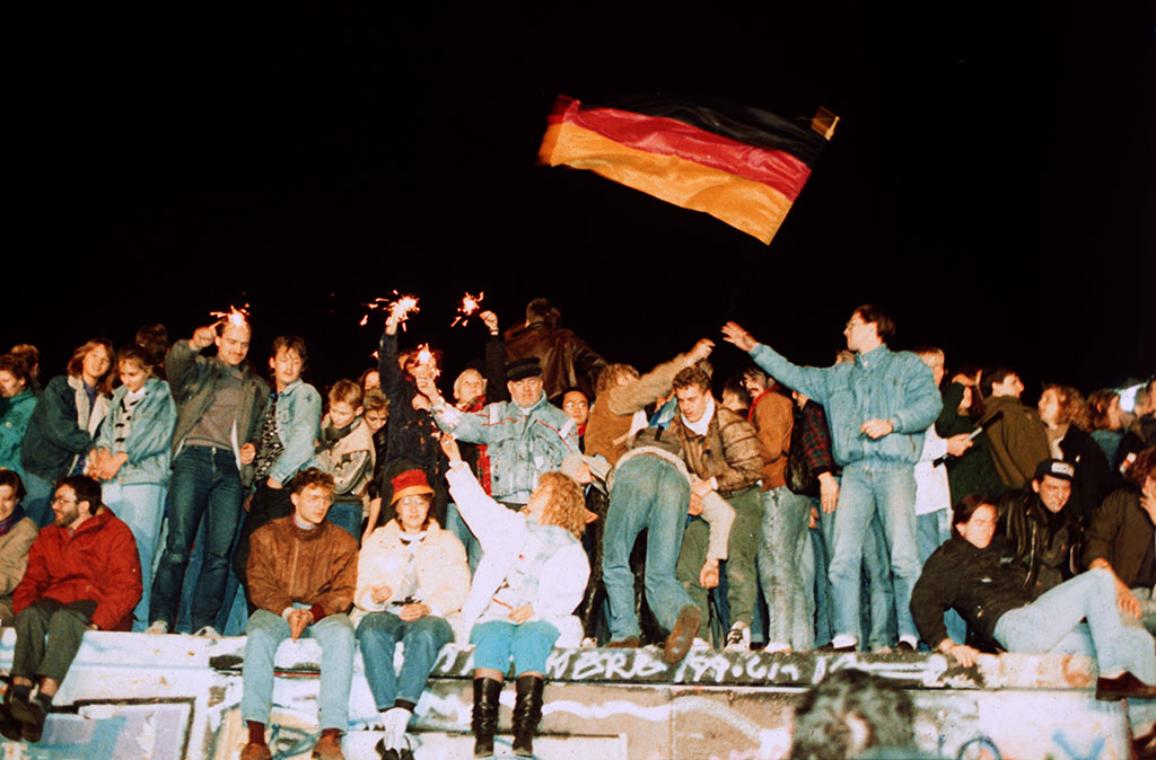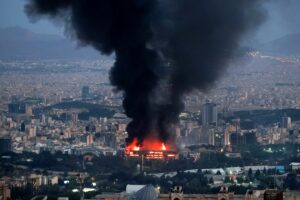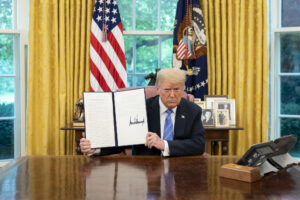White page, published in the Nouvel Observateur on 7 November 2019
“So what?” I retorted to her, both stupidly and rightly, because… I’m going to tell you. I had asked for the call the evening before. I had asked it for 7am, Paris time, the time when the typists arrived to the Monde. My pal with the husky voice had picked up the phone. “Come on, hurry up”, I told her. “I’ve got ten pages for you”. Silence, embarrassed silence on the other end of the line. “Bernard… I would be surprised if they took them. – Why wouldn’t they? – You don’t know? – What don’t I know? – The wall fell last night”.
“So what?”, I retorted, before I realised what I had just said, and I burst into laughter. I packed up my scoops on the beginnings of the Armenian secession and took to the streets of Yerevan before catching the first flight to Moscow. There was no CNN, no Internet, no mobile phones and not even a landline to make a direct international call. I could only imagine the joy that overwhelmed Central Europe after some 40 years of Soviet occupation. I thought back on that night of the proclamation of the “state of war” in Poland, on all my friends who were arrested in front of my eyes, on the fright of the Romanians, on the sorrow of the Czechoslovaks, on the haggard thin figure of Bukovski exchanged at the Zurich airport for Luis Corvalan, the head of the Chilean communist party. It was over, finally over, and I thought back on all these moments of a battle in which I had been so engaged, as journalist of the Observateur and then as correspondent of the Monde. I had believed in it, against all the experts, or almost all of them. Against every certainty of the era, freedom had finally won. It moved me, stirred me, but still, I could not stop repeating to myself: “So what?”
Yes, “So what ?”, because in the end, the wall had not just happened to fall that night.
Its first cracks had appeared the previous spring and Gorbachev had hardly been in his position for a year when, in November 1985, he warned the leaders of the People’s Democracies that they could no longer count on the help of the USSR to keep them in power. They had to open up, to engage in dialogue, to start reforms, to do the same thing that he himself began to do in Moscow. These things were said behind closed doors at a summit of the Warsaw Pact, the “NATO” of the communist block, but afterwards there were other declarations, too, before the UN General Assembly, the Council of Europe, or before the Yugoslavian leaders’ meeting, which were equally clear on the refusal of the use of force and on the necessary respect for the UN Charter and the Helsinki Accords.
The Polish, Hungarian and Czechoslovak leaders had received the message, and the Polish had even applauded it. “A revolution” is under preparation in Moscow, one of General Jaruzelski’s right hand men told me, clearly delighted about the news, as he was unable to run his country, where the situation never normalised, state of war declared or not. In Bucharest and in East Berlin, on the other hand, Honecker and Ceaușescu had not even wanted to listen. They gritted their teeth, kept hope, waited for Gorbachev to fall, and this division within the defunct Soviet camp became evident in January 1989.
Eleven months before the fall of the wall, eleven months before the East German leadership gave in to opening the checkpoints, the Hungarian party had engaged in the multi-party system. A month later the Polish had opened their “roundtable”, too, power and opposition acting together, and in August, Tadeusz Mazowiecki had become the first non-communist prime minister of the Soviet block.
Nearly deserted, and so ugly, the avenues of Yerevan stretched out in front of me without a single café in sight. I turned back to the hotel. Thanks to the Western radio stations, the guests and employees were up to date with the news, but they did not care about this Berlin wall, because they were getting ready for the fall of their own wall: to saying goodbye to their membership in the USSR.
It was the Russian empire’s undoing that I saw in Yerevan that 10th of November, the empire of the czars, that the Soviet Union had only perpetuated.
From the eyes, from the spirits, from the smiles you could tell that they were already at the next step, which was largely underway in the Baltic states already and which was now winning over the Caucasus, but, for the rest of the world it was necessarily in Berlin that the main event was happening, with these irrepressible crowds passing through to the West, drunk with happiness and discovering, a little frightened, lavish shop windows, supermarkets, terraces and the youth of West Berlin, more avant-garde in all things than anybody in California, and above all, far-left in a social democratic town.
I discovered these images in Moscow when I arrived, and I cried over them with emotion. I looked at them again and again until the small hours, but a voice within kept repeating: “So what?”, because everything happened too fast, not only too fast for this sublime moment that I was hoping for so much, but too fast for what was going to happen, because after all…
Because we do need dates, History tells us that the wall fell on the 9th of November 1989, but it was already in May that Hungary opened its border to Austria by shearing up the fence. With that everything got out of hand, and hordes of people from Eastern Germany occupied the embassies of the Federal Republic of Germany in Budapest, Prague and Warsaw; the negotiations to evacuate them towards the West started, and soon special trains were chartered for them. In fact, there was no wall anymore since the spring, and the block had laid down its arms without demanding anything in return. It happened before the ceremony of the 40th anniversary of the GDR saw hundreds of thousands of demonstrators chanting at Gorbachev’s, underneath Honecker’s nose: “Gorby! Help us! Gorby! Help us!”
That same evening, from the grandstand, Mieczyslaw Rakowski, the last secretary general of the Unified Workers Party of Poland, the PUWP , the communist party of Poland, leaned over to Gorbachev’s ear to ask him:
“Do you understand that this is the end?’’
One does not know, I certainly do not know what Mikhail Sergeyevich replied to him, but it is clear that he knew it, that he knew it since the spring’s breach in Hungary. He had even suspected it for much longer than that, and had accepted the assumption since the beginning, because his goal was not to save communism, which he knew was dead, but rather to save Russia from the collapse of communism and from the dislocation of the Soviet block.
Even after his death, Gorbachev will continue to be presented as a simpleton, overwhelmed by the circumstances which they say he had initiated without foreseeing their dynamic. The debate is not close to being over, but the man that I saw in exercise and that I have got to know so well afterwards was nothing of a sorcerer apprentice: “To govern means to be five steps ahead’’ is what he liked to say and when he informed the leaders of the G7 in 1991 in London that by the time of their next summit he would no longer be in power unless they help him to fill his stores, he was not wrong.
He, who had succeeded in taking the soviet fortress from its own keep, from within, brandishing Lenin and turning the democratic centralism against the machine, knew exactly what he was risking, but he also knew that he did not have a choice. Either he managed to organise a peaceful transition towards democracy and market economy, or everything was going to turn into a bloody chaos, which he did not want.
His whole obsession was to avoid a civil war and to transform the Soviet Union into a common market of sovereign states.
Because I am not a revolutionary but a reformer, because I prefer Turgot to terror, I had agreed with this attempt, but returning from Yerevan, having seen that the block was undone and that the European continent had not found new bases and knowing that the Soviet Union was doomed, I was thinking to myself that we were at that point now, Gorby was not going to be able to control anything anymore…
I did not know why, but, in this widespread joy the perspective of a global anarchy made me so afraid that at the time I convinced myself that only the unity of European democracies could offer the world the anchor it will desperately need. Faced with this “undefined future” as one of my Russian friends said, I no longer wondered “So what?” but rather “And now what?” and I prayed for Gorbachev to last long enough to be able to found what he called the “European Common House”, the cooperation of the two single markets, that of Rome and that of Moscow.
Of course, it did not happen. A month after the London G7 refused to help him, and a quarteron of soviet conservatives tried to force Gorbachev to sign his resignation. He refused, even when he was surrounded in a villa, risking death with his whole family. He returned to Moscow, but the president of the Russian Federation, Boris Yeltsin, has taken the lead after this failed coup d’Etat, and will dissolve the USSR by a decree in order to drive Gorbachev out of the Kremlin and to take his place.
Global anarchy is what we are in now, but what about this wall? Who made it fall? Who overcame communism?
This debate, like others, will never end, but nothing is more misleading than the inebriating images of the 9th of November. These images suggest that it is these crowds and their joy that have ended the seven decades of Sovietism, when in reality communism perished on its own for the very reason shown by its history: it was not viable.
The history of communism is that of a headlong rush that began in 1921, with the NEP, New Economic Policy. To avoid state bankruptcy, Lenin gave more leeway to market economy but, around 1928, the market regains such importance and its players such a weight that Stalin suddenly puts an end to it. Assassinations and deportations marked the beginning of a long decade of abominations that leaves the USSR exhausted and disarmed in front of the German army. Without the call to patriotism and to the Church, without the alliance with Great Britain and the United States, it would have been the end of the USSR, to which, however, the victory of 1944, the resumption of mass repression and the absorption of Central Europe gives back its muscle. Outside, the USSR is resplendent. Inside, it suffocates so much that the Political Bureau itself can no longer cope and when Stalin dies, the 20th Congress opens the field for negotiation and establishes the “thaw”. One generation of Russians had believed in real change, but the political apparatus is so frightened that Khrushchev is fired to be replaced by the Brezhnevian stagnation: neither liberalization nor return to terror; these two decades of standstill will finally impose Gorbachev, the youngest of the Soviet leadership, who was secretly convinced that the regime was falling apart.
It was communism that killed communism, but its agony would have been longer without social democracy and the dissidence. The welfare state in Europe and in the United States, was about social protection that had made the market economy so enviable and so superior to communism. While the courage of dissidents, so often coming from communists and from the Christian left, launched the challenge of freedom to the single party systems. Human rights and social protection, Keynes and Voltaire, the Enlightenment and social democracy made an alliance to precipitate the death of communism and to enable us to finally realise, one November 9th, that the wall was no longer there.




